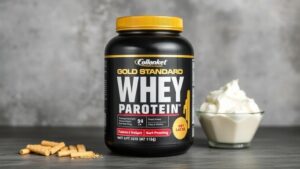If you’re lactose intolerant but still want the muscle-building benefits of whey protein, you’re probably wondering—does Gold Standard Whey Protein have lactose? The short answer is yes, but in very small amounts. Let’s break it down so you can decide if it’s right for you.
MY BLOG: {Gold Standard Whey Protein Has Lactose}
Why this question matters
Many people experience bloating, gas, or digestive discomfort after consuming dairy-based products. Knowing how much lactose is in your protein powder can save you a lot of stomach trouble.
Quick overview of whey protein
Whey protein is derived from milk during the cheese-making process. Since it’s dairy-based, some amount of lactose is naturally present.
Understanding Lactose in Dairy-Based Products
What is lactose?
Lactose is a natural sugar found in milk and dairy products. It’s broken down in the body by the enzyme lactase.
Why are some people lactose intolerant?
Some people don’t produce enough lactase, making it hard to digest lactose. This leads to bloating, gas, cramps, or diarrhea.
Symptoms of lactose intolerance
Bloating
Gas
Diarrhea
Types of Whey Protein
Not all whey proteins are created equal when it comes to lactose.
Whey protein concentrate
Contains more lactose (up to 5% depending on purity)
More affordable but not ideal for sensitive stomachs
Whey protein isolate
Highly filtered
Contains less than 1% lactose, making it much easier to digest
Hydrolyzed whey
Pre-digested for faster absorption
Minimal lactose, best for very sensitive individuals
What is Gold Standard Whey Protein?
Brand overview
Optimum Nutrition’s Gold Standard Whey is one of the most popular protein powders globally, loved for its quality and taste.
Key ingredients
Whey protein isolate (primary source)
Protein concentrate
Whey peptides
Protein blend composition
It’s a mix of isolate and concentrate, which means it has a small but present amount of lactose.
Does Gold Standard Whey Protein Contain Lactose?
Yes—but in very small amounts.
Lactose content in whey concentrate
Whey concentrate can have higher lactose, but Gold Standard uses only a small percentage of concentrate.
Lactose content in whey isolate
Whey isolate is the primary ingredient, and it’s almost lactose-free.
Exact lactose levels in the Gold Standard
Each scoop has less than 1g of lactose, which most mildly lactose-intolerant people can handle.

Is Gold Standard Whey Safe for Lactose-Intolerant People?
Mild vs. severe lactose intolerance
Mild intolerance: You’ll likely be fine since the lactose level is very low.
Severe intolerance: It might still cause discomfort, so proceed with caution.
How to test your tolerance
Start with half a scoop and see how your body reacts.
Alternative protein options
If even small amounts bother you, try plant-based or egg white protein powders.
Gold Standard Whey Isolate vs. Regular Whey
Which has less lactose?
Gold Standard Isolate is even lower in lactose than the regular blend. It’s the safer choice for lactose-sensitive users.
Best option for sensitive stomachs
Choose 100% whey isolate for minimal lactose content.
How to Reduce Lactose Discomfort
Pairing with lactase enzyme supplements
You can take a lactase enzyme pill before consuming the shake to help digestion.
Gradual introduction for mild cases
Slowly build tolerance by introducing small servings.
Other Lactose-Free Protein Powders
Plant-based proteins
Pea, rice, or hemp protein are completely dairy-free.
Egg white protein
A great lactose-free option with high bioavailability.
Beef protein isolate
Another dairy-free alternative for those avoiding lactose.
Reading the Label Correctly
What to look for
Look for terms like “whey isolate” or “low-lactose” on the packaging.
Understanding “may contain traces” warnings
Even lactose-free products might have trace amounts due to manufacturing environments.
Nutritional Benefits of Gold Standard Whey
High-quality protein
Provides all essential amino acids for muscle repair and growth.
BCAAs for muscle recovery
Each scoop has over 5g of BCAAs, essential for recovery after workouts.
Easy digestion for most people
Low lactose means fewer digestive issues for most users.
Common Myths About Whey and Lactose
All whey = high lactose?
Not true. Isolate forms have very little lactose.
Lactose-free doesn’t mean dairy-free
Whey is still derived from milk, even if it has minimal lactose.
Expert Tips for Choosing the Right Protein
Assessing your body’s needs
Choose based on your fitness goals and digestive comfort.
Consulting a nutritionist
If you’re unsure about your lactose tolerance, seek professional advice.

Final Verdict
Gold Standard Whey Protein does contain lactose, but only in tiny amounts—usually less than 1g per scoop. For most mildly lactose-intolerant people, it’s perfectly fine. If you have a severe intolerance, go for Gold Standard Isolate or a lactose-free alternative like plant-based protein.
FAQs
Q1: Can I drink Gold Standard Whey with lactose intolerance?
Yes, if your intolerance is mild. For severe cases, choose whey isolate or a plant-based protein.
Q2: How much lactose is in one scoop?
Less than 1g per scoop, which is very low.
Q3: Is Gold Standard Whey dairy-free?
No, it’s still a milk-derived product, even if it’s low in lactose.
Q4: What’s the difference between lactose-free and low-lactose?
Low-lactose means it has minimal lactose. Lactose-free means it has none at all.
Q5: Which protein powder is 100% lactose-free?
Plant-based, egg white, or beef protein isolates are completely lactose-free.

